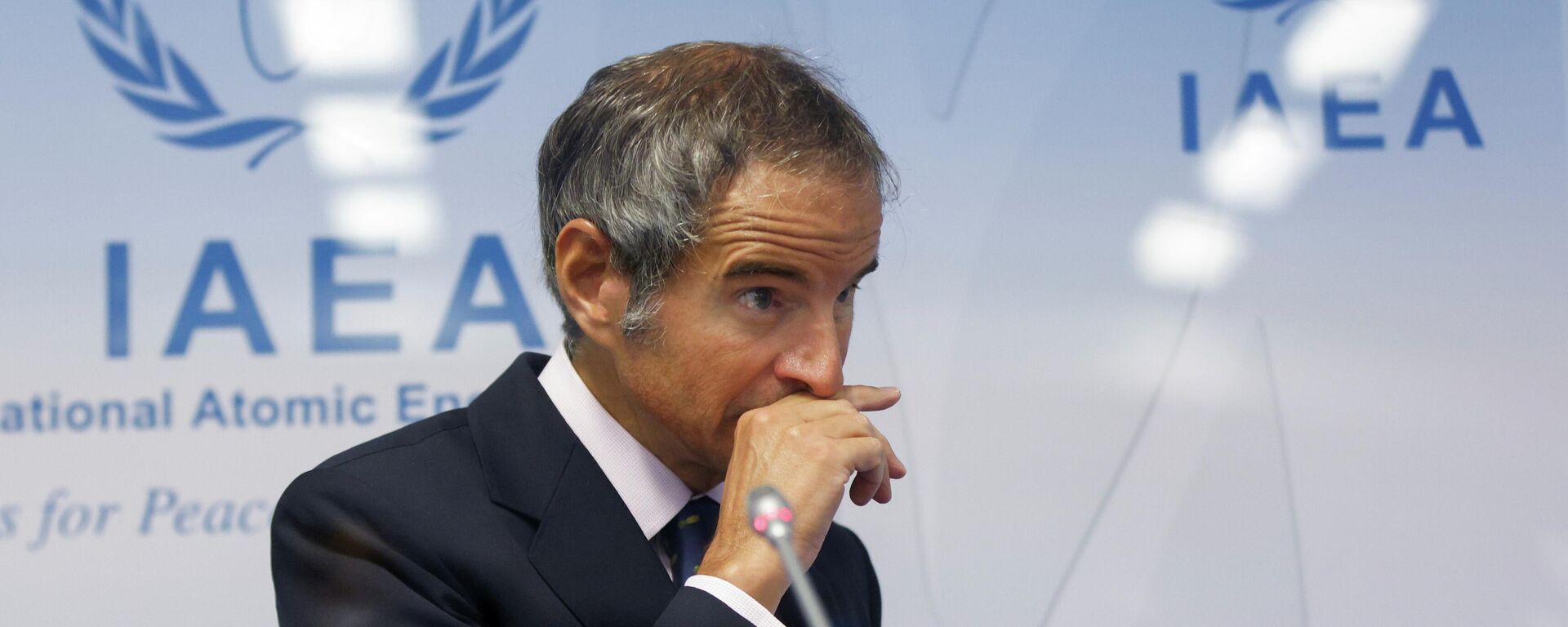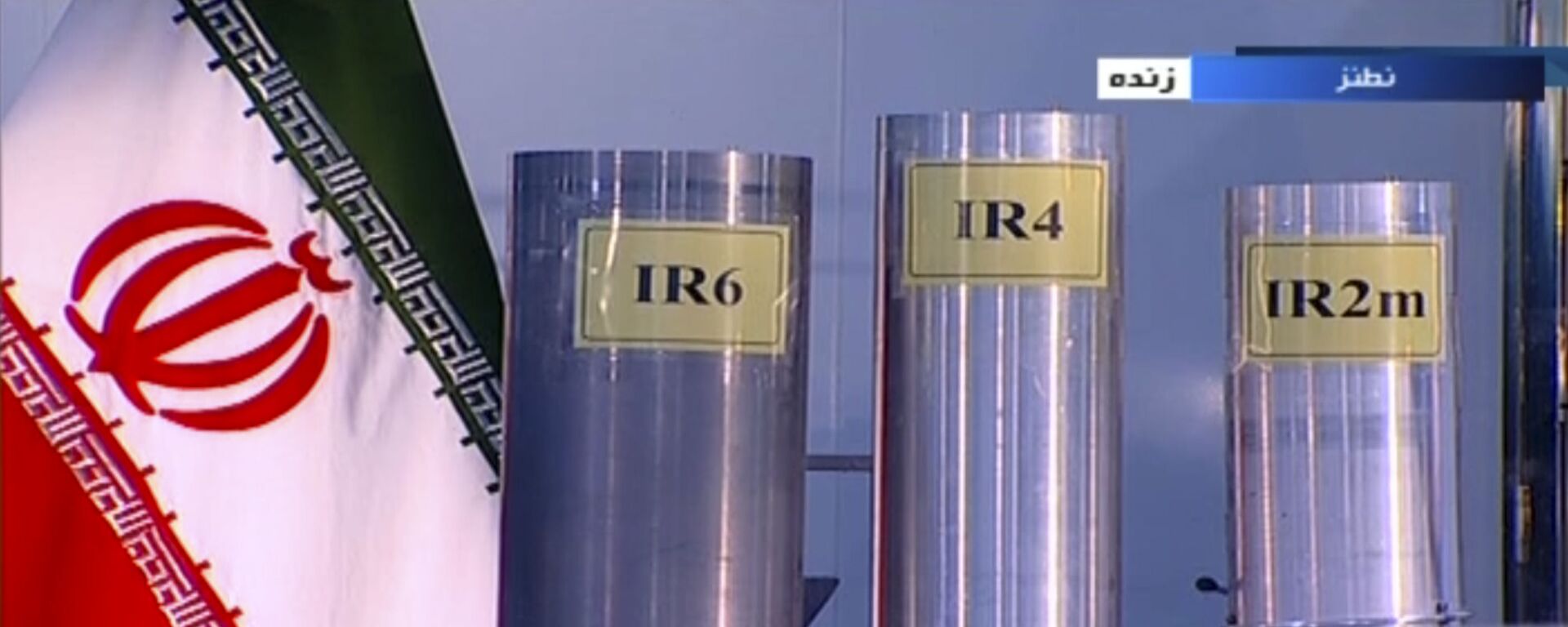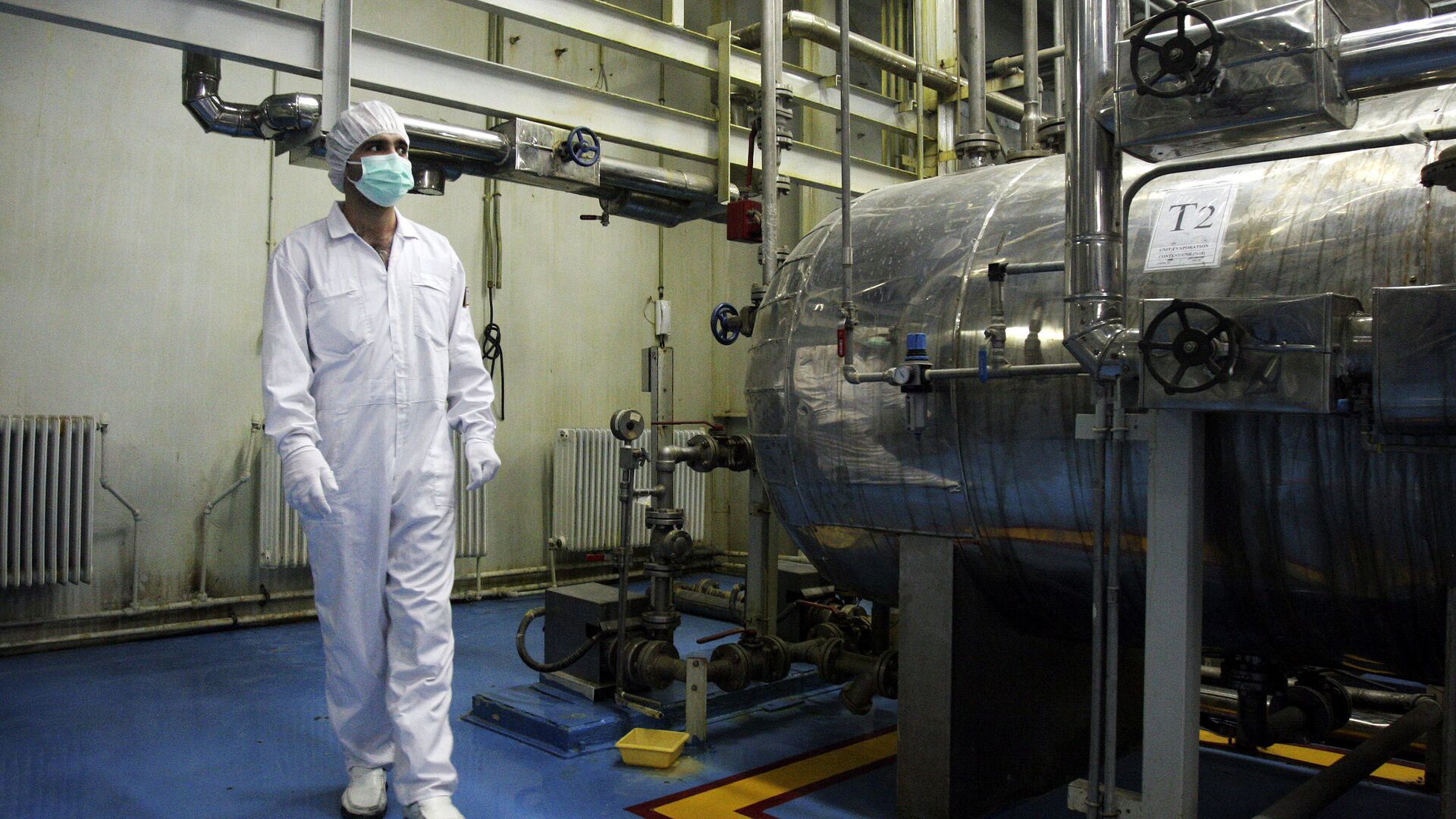https://sputnikglobe.com/20220105/israels-intel-chief-says-revival-of-iran-nuclear-deal-better-than-collapse-of-jcpoa-talks-report-1092033270.html
Israel's Intel Chief Says Revival of Iran Nuclear Deal Better Than Collapse of JCPOA Talks: Report
Israel's Intel Chief Says Revival of Iran Nuclear Deal Better Than Collapse of JCPOA Talks: Report
Sputnik International
Aharon Haliva, head of the Israel Defence Forces (IDF)'s Operations Directorate, reportedly believes that a return to the 2015 Iran nuclear deal is better for Tel Aviv than the collapse of the Vienna talks on the accord.
2022-01-05T09:57+0000
2022-01-05T09:57+0000
2023-01-15T17:25+0000
iran
talks
agreement
joint comprehensive plan of action (jcpoa)
israel
https://cdn1.img.sputnikglobe.com/img/107627/45/1076274587_0:160:3073:1888_1920x0_80_0_0_d95b3e3493aa35ea46883f6b65533a3c.jpg
Aharon Haliva, head of the Israel Defence Forces (IDF)'s Operations Directorate, reportedly believes that a return to the 2015 Iran nuclear deal is better for Tel Aviv than the collapse of the Vienna talks on the accord, also known as the Joint Comprehensive Plan of Action (JCPOA).According to Walla, the comments by the IDF intelligence head were in response to Mossad chief David Barnea, who continues to oppose the JCPOA and insists there is still time to influence the US concerning the terms of the Iran deal.The remarks came after Israeli Foreign Minister Yair Lapid stressed that Tel Aviv has "no problem" with the JCPOA in principle and that "a good deal is a good thing"."Second best would be no deal but tightening the sanctions and making sure Iran cannot go forward. And the third and worst is a bad deal". In late November, Israeli Prime Minister Naftali Bennett made it clear that his country will maintain its freedom of action if a new nuclear deal between Tehran and world powers is reached at the Vienna talks.The latest round of talks on the JCPOA began in the Austrian capital after a short pause on Monday, with the US State Department reportedly saying that Iran should "add real urgency" to the Vienna negotiations or risk losing any chance of the accord being revived.Iran expects the US to "offer a tangible text", in which case an agreement can be reached "in the shortest possible time", the spokesman said.In 2015, Iran signed the JCPOA with the P5+1 group of countries — the US, China, France, Russia, the UK plus Germany — and the EU. The agreement obligated Tehran to scale back its nuclear programme and significantly decrease its uranium reserves in exchange for sanctions relief, including the lifting of an arms embargo five years after the deal's adoption.In May 2018, the US unilaterally withdrew from the deal and reimposed sanctions on Iran, prompting Tehran a year later to announce that it was starting to scale back its own JCPOA commitments. The Biden administration signalled its readiness to return to the agreement, with Iran saying that the White House should first scrap all sanctions against the Islamic Republic.
https://sputnikglobe.com/20211215/iaea-chief-says-2015-nuclear-deal-needs-adjustments-in-2022-for-a-very-different-iran-1091555965.html
https://sputnikglobe.com/20211013/there-should-be-a-possibility-to-negotiate-deal-stronger-than-jcpoa-us-special-envoy-to-iran-says-1089895962.html
iran
israel
Sputnik International
feedback@sputniknews.com
+74956456601
MIA „Rossiya Segodnya“
2022
Oleg Burunov
https://cdn1.img.sputnikglobe.com/img/07e4/09/0b/1080424846_0:0:2048:2048_100x100_80_0_0_3d7b461f8a98586fa3fe739930816aea.jpg
Oleg Burunov
https://cdn1.img.sputnikglobe.com/img/07e4/09/0b/1080424846_0:0:2048:2048_100x100_80_0_0_3d7b461f8a98586fa3fe739930816aea.jpg
News
en_EN
Sputnik International
feedback@sputniknews.com
+74956456601
MIA „Rossiya Segodnya“
Sputnik International
feedback@sputniknews.com
+74956456601
MIA „Rossiya Segodnya“
Oleg Burunov
https://cdn1.img.sputnikglobe.com/img/07e4/09/0b/1080424846_0:0:2048:2048_100x100_80_0_0_3d7b461f8a98586fa3fe739930816aea.jpg
jcpoa, vienna talks, idf, sanctions, israel, iran
jcpoa, vienna talks, idf, sanctions, israel, iran
Israel's Intel Chief Says Revival of Iran Nuclear Deal Better Than Collapse of JCPOA Talks: Report
09:57 GMT 05.01.2022 (Updated: 17:25 GMT 15.01.2023) In December, Israeli Foreign Minister Yair Lapid made it clear that Tel Aviv is not opposed in principle to any accord that may be concluded between world powers and Tehran at the ongoing Vienna talks on the possible revival of the Iran nuclear deal.
Aharon Haliva, head of the Israel Defence Forces (IDF)'s Operations Directorate, reportedly believes that a return to the 2015 Iran nuclear deal is better for Tel Aviv than the collapse of the Vienna talks on the accord, also known as
the Joint Comprehensive Plan of Action (JCPOA).
The Israeli news outlet Walla cited unnamed government sources as saying that Haliva added that a revival of the deal would give the Jewish state more time to prepare for various scenarios of escalating tensions with Iran, and that the country would be in a better position to gear up for such possibilities.
According to Walla, the comments by the IDF intelligence head were in response to Mossad chief David Barnea, who continues to oppose the JCPOA and insists there is still time to influence the US concerning the terms of the Iran deal.

15 December 2021, 23:34 GMT
"It's not lost and it's worth investing time and effort in a dialogue with the Americans about the contents of the agreement", Barnea reportedly told reporters.
The remarks came after Israeli Foreign Minister Yair Lapid stressed that Tel Aviv has "no problem" with the JCPOA in principle and that "a good deal is a good thing".
"Second best would be no deal but tightening the sanctions and making sure Iran cannot go forward. And the third and worst is a bad deal". In late November, Israeli Prime Minister Naftali Bennett made it clear that his country will maintain its freedom of action if a new nuclear deal between Tehran and world powers is reached at the Vienna talks.
The latest round of talks on the JCPOA began in the Austrian capital after a short pause on Monday, with the US State Department reportedly saying that Iran should "add real urgency" to the Vienna negotiations or risk losing any chance of the accord being revived.
Last month, Iranian Foreign Ministry spokesman Saeed Khatibzadeh said that the US hadn't made any suggestions that could lead to the revival of the JCPOA or the drafting of a new deal during the five-way talks in Vienna.
Iran expects the US to "offer a tangible text", in which case an agreement can be reached "in the shortest possible time", the spokesman said.

13 October 2021, 14:45 GMT
In 2015, Iran signed the JCPOA with the P5+1 group of countries — the US, China, France, Russia, the UK plus Germany — and the EU. The agreement obligated Tehran to scale back its nuclear programme and significantly decrease its uranium reserves in exchange for sanctions relief, including the lifting of an arms embargo five years after the deal's adoption.
In May 2018, the US unilaterally withdrew from the deal and reimposed
sanctions on Iran, prompting Tehran a year later to announce that it was starting to scale back its own JCPOA commitments. The Biden administration signalled its readiness to return to the agreement, with Iran saying that the White House should first scrap all sanctions against the Islamic Republic.




